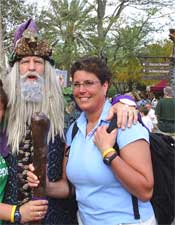
Throughout our website
we have discussed the lack of media attention to female athletes, but
one issue we failed to address was the lack of female coaches. For most
of us our coaches have been primarily males even though the sports we
participate in are dominantly female. This issue caused us to question
why that is because there a lot of female athletes, and one could assume
that most would want to coach in the future even if just for fun. To
answer some of the questions we had, we turned to the woman who coaches
two varsity sports at Elmira College, Rhonda Faunce.
Coach Faunce has been the head volleyball and softball coach
at Elmira College for eighteen years and she also takes on
the duty of being the Director of Physical Education. If
any students need work study hours they can ask Coach Faunce
because she is also in charge of our Fitness Center and pool.
A typical day consists of teaching one of her physical education
classes, lunch, and then making plans for the practice that
will take place some time in the afternoon. Her myriad of
duties can take up a lot of time, and most of the time even
after arriving home her work is still incomplete. It takes
a lot of energy and time to coach two varsity sports on the
college level, which Coach Faunce considers the two biggest
struggles in coaching two sports, but after experience it
seems that she has found a way to manage it all. She credits
her assistant coaches with a lot of the help that she needs.
They are in charge of recruiting and are qualified to fill
in when there are time conflicts or any issues involving
her time spent with each team.
 Being
a female coach we wondered if she approached coaching with
a different style than a male coach. Coach Faunce happily
acknowledges her high school and college coaches because
they were both women and had two completely different approaches
to coaching. One was more strict and dominant, while the
other had a more laid back and calm approach to coaching.
She had the opportunity to view the way both of these women
approached their sport and then put her own style together.
Having two female coaches and being a female coach herself,
Coach Faunce could be considered the oracle to everything
one needs to know about the female coaching world. However,
Coach Faunce claims that while she is very set in her ways
and beliefs about coaching she realizes that as times change
so do people and the group of athletes she has every year
are not going to be exactly the same as the group that she
used to have and she must modify her coaching tactics to
accommodate that fact. Ultimately though, athletes are there
to play a sport that they love and to win and that is a fact
that will never change.
Being
a female coach we wondered if she approached coaching with
a different style than a male coach. Coach Faunce happily
acknowledges her high school and college coaches because
they were both women and had two completely different approaches
to coaching. One was more strict and dominant, while the
other had a more laid back and calm approach to coaching.
She had the opportunity to view the way both of these women
approached their sport and then put her own style together.
Having two female coaches and being a female coach herself,
Coach Faunce could be considered the oracle to everything
one needs to know about the female coaching world. However,
Coach Faunce claims that while she is very set in her ways
and beliefs about coaching she realizes that as times change
so do people and the group of athletes she has every year
are not going to be exactly the same as the group that she
used to have and she must modify her coaching tactics to
accommodate that fact. Ultimately though, athletes are there
to play a sport that they love and to win and that is a fact
that will never change.
All of us are athletes ourselves so we had a lot of questions about how coaches view coaching men versus women, and what the difference between the two is from a coach’s perspective. Coach Faunce has known what career she wanted for most of her life and for the majority of that time she never had any intentions of coaching men. Although after eighteen years of coaching two sports of women, she now thinks that maybe she would like to coach a group of men. Women bring a lot more to the field or court than their desire to win. There is a lot of baggage and outside issues that, in Coach Faunce’s experience, the women she coached have not been able to leave off the field or court for the duration of the season. She has never coached men, but it appears that men do not seem to have that problem and that makes coaching a lot less difficult emotionally.
| " My biggest challenge was going from athlete to coach...I expected things from players that I think I can still do." |
Coach Faunce is also a unique coach because she has participated
in the two sports she now coaches. At Ithaca College, she
played both volleyball and softball and has earned numerous
honors and victories for each sport. We assumed
that this would make the transition from athlete to coach
easy, but Coach Faunce informed us that this was not true
at all. Being a talented athlete, a coach can make the mistake
of expecting every athlete they coach to be exactly like
them in terms of desire and ability. Yet, as previously discussed
athletes come in all forms that change with time and it can
be extremely difficult to understand how a person that plays
the same sport that you did can have such a different mentality.
Surprising to us, Coach Faunce claimed that coaches that
have not participated in the sports they coach may have a
slight advantage because they have watched and understand
that athletes are on different skill levels and can therefore
teach them accordingly. Through experience and removing yourself
from the game, a coach can learn to have more respect for
the athletes and realize not to be as difficult on them as
they previously were. However, from her experience athletes
tend to appreciate the coach more because the coach did play
the sport and that is an advantage in itself.
We assumed
that this would make the transition from athlete to coach
easy, but Coach Faunce informed us that this was not true
at all. Being a talented athlete, a coach can make the mistake
of expecting every athlete they coach to be exactly like
them in terms of desire and ability. Yet, as previously discussed
athletes come in all forms that change with time and it can
be extremely difficult to understand how a person that plays
the same sport that you did can have such a different mentality.
Surprising to us, Coach Faunce claimed that coaches that
have not participated in the sports they coach may have a
slight advantage because they have watched and understand
that athletes are on different skill levels and can therefore
teach them accordingly. Through experience and removing yourself
from the game, a coach can learn to have more respect for
the athletes and realize not to be as difficult on them as
they previously were. However, from her experience athletes
tend to appreciate the coach more because the coach did play
the sport and that is an advantage in itself.
While there seems to be some advantages and disadvantages
to being an athlete that transitioned to the coaching
world, is there also an advantage to being a woman that
is coaching
women? According to Coach Faunce there really isn’t
too much of a difference because it all depends on the
athletes and what gender their coaches were growing up.
She does not
get to coach these girls until they have reached the
college level, and Coach Faunce realizes that these girls
have
had a lot of other coaches before her. Most of the girls
she
coaches have never had a female coach, which brought
us to the questions of why that is. Coach Faunce and
her previous
coaches are certainly exception to the rule and we all
wondered
what her opinion on that was. She believes that the reason
men will continue to be dominant in the coaching world
because men cannot have children. As most female athletes
grow up
they get married and have children. Most of these women
also want to be the primary caregiver to those children,
leaving
men plenty of time to do other things such as coach.
She does not believe there is any kind of bias towards
hiring
a male coach versus a female coach, but there is simply
a lack of qualified women for these jobs, mostly because
of
parental issues.
| " Men cannot have babies and until they can have babies, women would rather have children and raise them." |
Since our website is based on the lack of
media coverage we wanted to know how Coach Faunce felt
about these issues
and her teams in general. She told us that in terms of the
town of Elmira, there is an amateur hockey team and therefore
the town is going to be primarily concerned with hockey.
This is a men’s team and therefore it is realistic
that the college’s men’s hockey team is going
to receive the most coverage of any sport. The sport that
a particular town is going to be interested in is going to
be unique to that town and what occurs there. As far as overall
coverage, Coach Faunce has been impressed with the amount
of coverage that has developed for women over the years.
Twenty years ago a female athlete would never be on television
and this past weekend she was able to watch college softball
on television. In her opinion, for women to be on the same
level as male athletes in terms of coverage and coaching
it is going to take a lot more hard work and desire in women
to want to do that, and it may never happen.
Coach Faunce is clearly a unique and exceptional woman, who
manages to balance her own life with work and the lives of
each athlete she coaches. Alumni from years past are always
stopping by and each year is filled with new faces and new
memories to be made. For Coach Faunce, being able to have
an impact on the lives of these women is one of the best
things about coaching and every time an athlete comes to
visit is a reminder of why she has stayed at Elmira for her
career. Having the ability to be around when athletes return
for visits make the best memories for Coach Faunce, and it
is clear by the number of women that do continue to visit
that she has made a significant and positive impact on their
lives. That my friends, is what makes a good coach.
